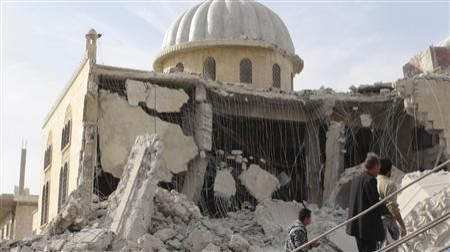Russia May Be Printing Banknotes To Keep Syrian Regime Going: Report

Russia may be helping to prop up the bloody, but beleaguered, regime of Syrian President Bashar al-Assad by airlifting billions in dollars in cash to pay his soldiers and bureaucrats.
According to a study by ProPublica, an independent, nonprofit investigative news source, at least 200 – maybe as many as 240 -- tons of bank notes were transported from Moscow to Damascus on a Syrian government plane over the summer, flight records and manifests indicate.
Russia, along with China, has steadfastly supported Assad since the rebellion against his regime erupted some 20 months ago at a cost of some 40,000 lives and counting.
But the endless onslaught against rebels and civilians has come at a grave price for the Syrian economy and the regime's stability – sanctions by the West and the prohibition of printing Syrian currency have hindered Assad's ability to carry out his crackdown. (EU sanctions meant that an Austrian bank lost its right to mint Syrian banknotes).
“Having currency that you can put into circulation is certainly something that is important in terms of running an economy and more so in an economy that has become more cash-based as things deteriorate,” Daniel Glaser, assistant secretary of the Treasury for terrorist financing and financial crimes, told ProPublica. “It is certainly something the Syrian government wants to do, to pay soldiers or pay anybody anything."
Sanctions by the U.S. are also crippling the Syrian military.
“Increasingly, it is more difficult to finance the war machine and the cost of the war is becoming more expensive for the Assad regime,” an anonymous U.S. government official told the service. "Targeted sanctions on those leading the violence are working and start to bite into their pocket books.”
Syria itself has even admitted in the past that Russia is printing cash for them,
In August, the official Syrian Arab News Agency quoted Qadr Jamil, Syria’s deputy prime minister for economic affairs, as saying that a financial deal with Moscow represented a “triumph” over Western sanctions.
Ibrahim Saif, a political economist based in Jordan and a resident scholar at the Carnegie Middle East Center, said he thinks that Damascus is exchanging old money for new notes, but also printing money because they need new notes.
“Most of the government revenue that comes from taxes, in terms of other services, it’s almost now dried up,” he said. “[But] they continue to pay salaries. They have not shown any signs of weakness in fulfilling their domestic obligations. The only way they can do this is to get some sort of cash in the market.”
Saif further estimated that since the rebellion exploded, Syria's foreign currency reserves have dropped from $17 billion to about $6 billion to $8 billion, with about $500 million spent every month to keep the government in business.
“It’s possible the Syrians are acquiring foreign currency reserves, either euros or U.S. dollars, which they would need to conduct any serious commerce,” said Juan Zarate, a former assistant secretary of the Treasury for terrorist financing and financial crimes.
© Copyright IBTimes 2024. All rights reserved.





















